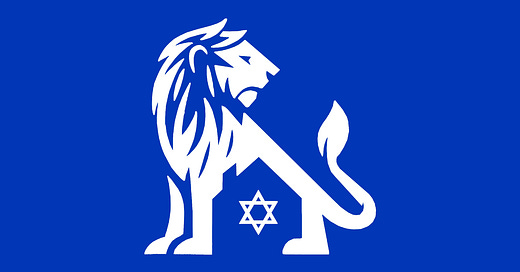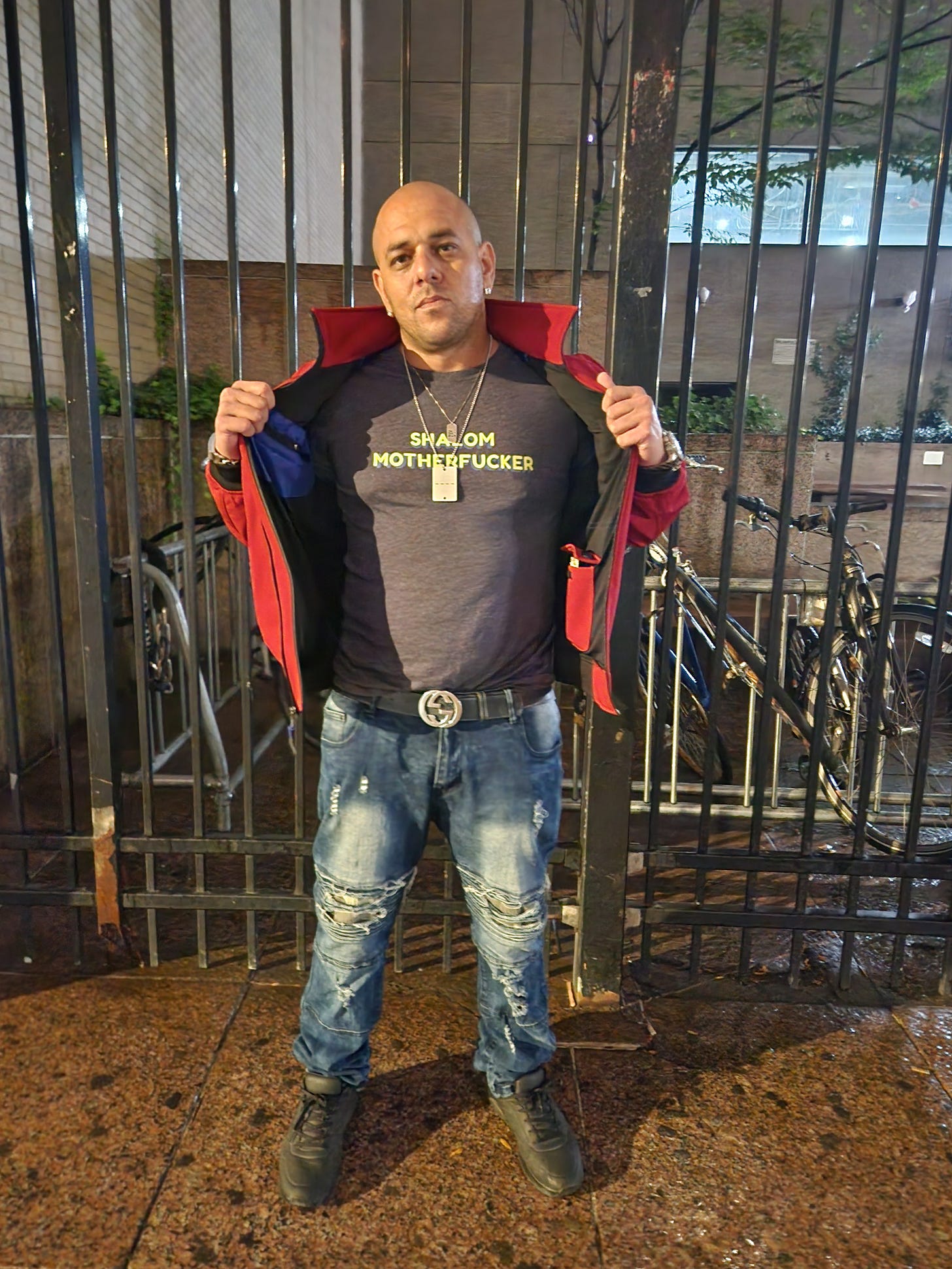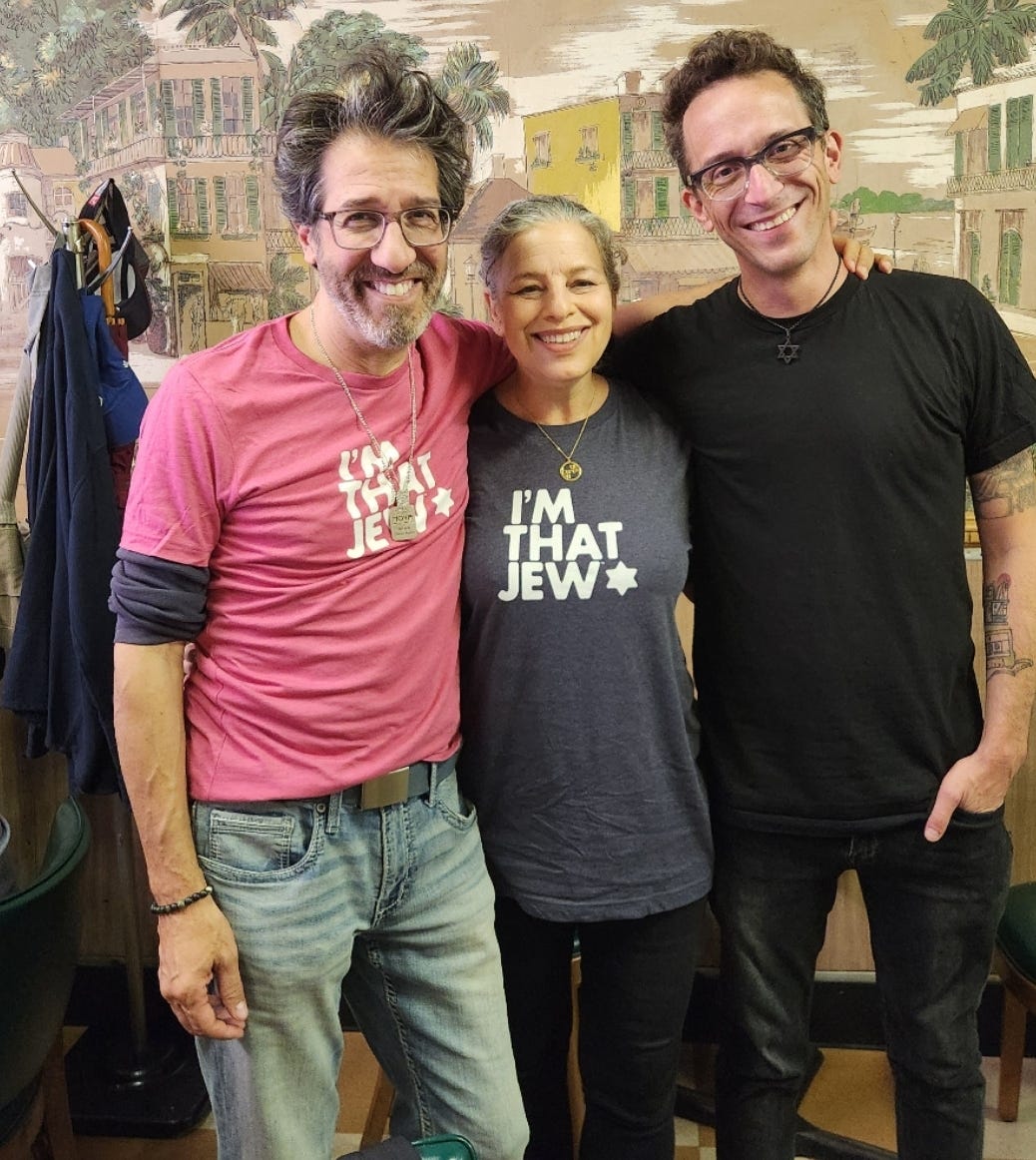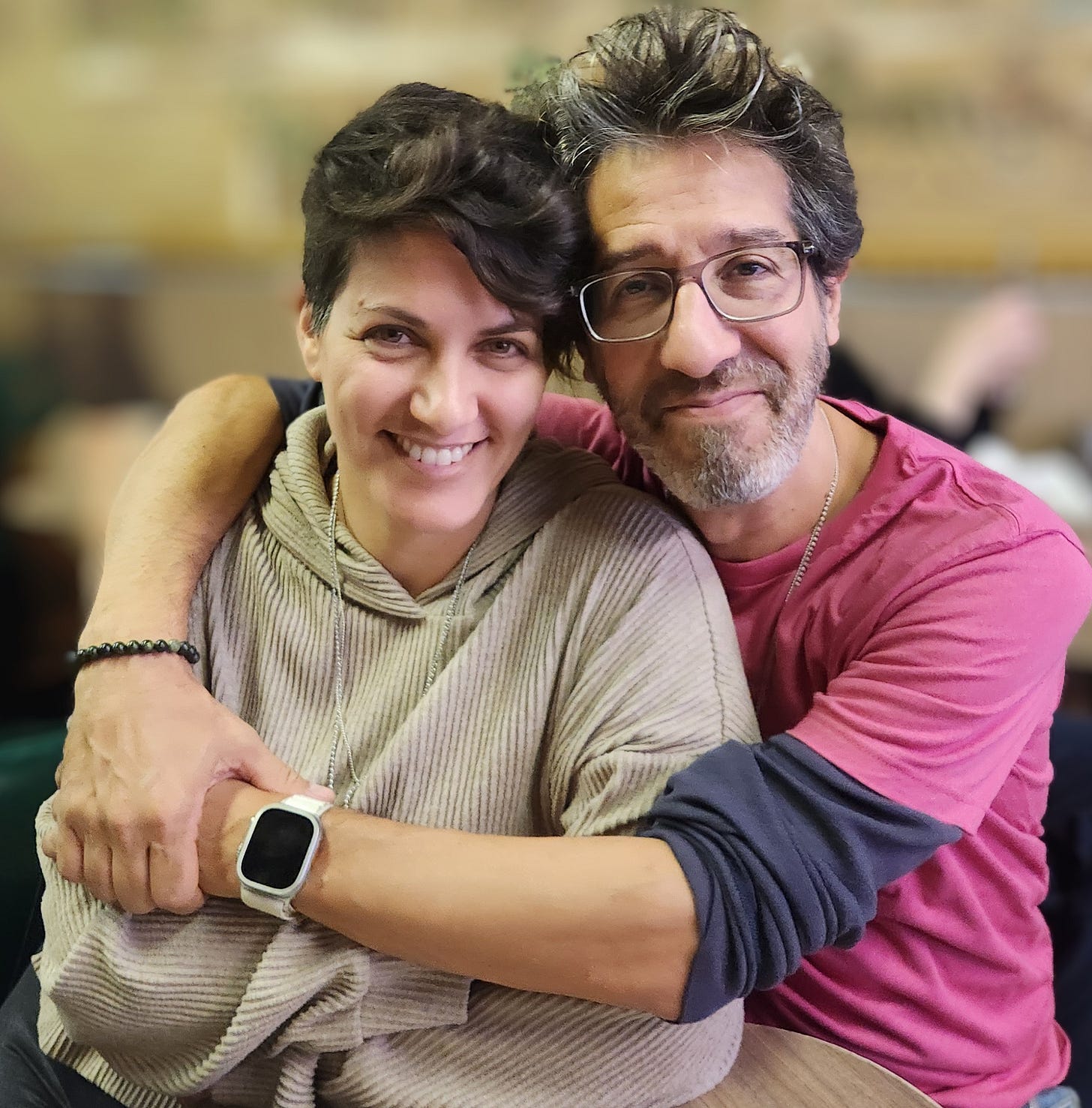Hey, beloved tribe.
So I don't know why I’ve waited so long to tell this story. As it was happening, I thought I’d write about it the moment I got home from NYC in September. But so much happened on that trip. The glory of NYC is that you can likely meet a Jewish world luminary every day of the year if you have the energy to go to wherever they are, and there were a lot of other stories to tell.
In any event, toward the end of my stay, I met three Jews who have long had my abject love and admiration for their gorgeous voices since October 7, 2023.
One is professor Shai Davidai of Columbia University. I remember with tingling clarity the way this video was circulated within so many of my Jewish friendship circles just after Hamas’ attack on our people.
Shai’s impassioned rant to students on the lawn of Columbia University on a night very soon after the massacre had, to us, the power of a hero’s soliloquy. Seen from one angle, he was the madman ranting on the corner, no longer trying to change anyone else’s mind but screaming into the void so that no one would be able to change his.
He prefaced his remarks by stating that they were for the parents of Jewish students at the school.
My name is Shai Davidai and I am a professor at Columbia Business School. I am an Israeli, but before all that, I am a dad. I have two beautiful children and I’m speaking to you as a dad. And I want you to know: we cannot protect your children from pro-terror student organizations because the president of Columbia University [and Harvard and Stanford and Berkeley] will not speak out against pro-terror student organizations…
None of the presidents of universities all around the country are willing to take a stand. This is what cowards do, and I’ll name it now. President Minouche Shafik of Columbia University: you are a coward!
Last week, we had thousands of students chanting pro-terror songs that are sung right now in Iraq, in Libya, in Yemen, in Afghanistan. They were singing these not in Gaza, not in Afghanistan — here! In New York City! And this is the school you want to send your children to? They were celebrating the rape of teenage girls at a music festival in the name of resistance!
We would never allow the KKK to march on our campus. We would never allow a pro-ISIS demonstration on our campus. Can you imagine in the city that had to endure 9/11… can you imagine that here we have pro-terror student organizations?
People have asked me in the past few days: ‘Aren’t you afraid to speak up? You’re putting your job on the line.’
You’ve got it all wrong. I am not afraid to speak up. I’m speaking up because I’m afraid. I am speaking up because I walked onto my own campus — the place that’s employing me and is supposed to keep me safe — and I was shivering! I am 40 years old and I was shivering to come to my own [place of] employment. Imagine not being able to go to your work[place] because your boss does not value your life — because your boss supports pro-terror organizations.
Fam, it’s just a little over a year later, and Professor Shai Davidai is no longer allowed on the campus of Columbia, while another Columbia professor, Joseph Massad, who openly, publicly celebrated — gloated over — the October 7th massacre is there right now, teaching a course on Zionism.
At any rate, after watching the clip above, I resolved to meet Shai Davidai, if at all possible, the next time I was in NYC. I also resolved to meet the author of a searing essay about the way the literary world is ostracizing the Jewish writers in their community. She wrote about being ousted by her writing group in the wake of October 7th. Here is an excerpt and I urge you to read the whole essay when you can:
All at once, my relationship with several members of the group went south. They cited my social media activity — raising awareness of Hamas’s crimes, calling on the world to demand the release of hostages, and condemning protests that reframed murder and rape as resistance — as insensitive, nationalistic, and myopic. There may have been other reasons for the rift that developed, but I wasn’t given any, so all I have is my own understanding of the situation. We had years of close, intimate friendship under our belts. (If you’ve ever been part of a writing group, you know all too well the vulnerability this entails. Especially if, like me, you have been working on a memoir.) I spent a good long while looking back at every single thing I’d posted, but found no calls for violence in my words, no hatred directed at any group of people. I only found the fear, turmoil, and urge to make the world understand what any Jewish Israeli was expressing. Was that the problem?
The essay’s conclusion made me tingle with appreciation:
I don’t want to hide, and I don’t want to choose. While not every piece of writing I create may be Jewish or Zionist in nature, while Israel might often come up in a critical tone in my writing, or not come up at all, my voice would not be my voice if I had to police my identity, to choose whether I can be a Jew or a memoirist, a Jew or an essayist, a Jew or a feminist, a Jew or a liberal, a Jew or an anti-racist, a Jew or a whole person, full of values and complexities. I’d rather be allowed to be both Jewish and human. I want to interact both with the Jewish and the non-Jewish world, not to be limited either in the audience I can reach or in what I can explore.
But if I am made to choose, then to me the answer is clear. My identity is unqualified and unequivocal. I am to myself what I am to those whose mouths fill with bile when they speak the word. I’m a Jew.
The writer of these fierce and beautiful words is Yardenne Greenspan, and I yearned to meet her as fiercely as I longed to meet Shai.
I didn’t yet realize that they were married to each other.
Finally, there was yet another valiant figure with whom I wanted to connect: Eitan Chitayat, who created the electrifying video: I’m That Jew.
Fam, if you haven’t yet seen it, there are few better ways to spend 6 minutes:
Anyway, I had my chance, because of course I did — that’s what New York is for.
After we connected on social media, Yardenne invited me over for tea one evening and we talked for hours like sisters. I was struck by her brilliance, her integrity, and all she is doing to keep the home fires burning while Shai goes to countless speaking engagements, even as she does her own incredible work.
And just an evening or two later, both Eitan and Shai were presenting at a local synagogue and I went to hear them speak.
I got there early, hoping that would give me an edge when it came to meeting these two. It didn’t. I remember that I was especially bent on connecting with Eitan because he lives in Tel Aviv and I knew from talking with Yardenne that he was flying back home the very next day. Shai was local, but if I wanted to meet Eitan, it was now or never (or at least a very long time).
I went up to him as he was talking with someone else and stood there in a way that made it clear I was waiting my turn. When that person was about to move away, I watched Eitan begin to shift his attention to me, but before we could speak to one another, an elderly woman rushed up to him, weeping. She had some very personal and immediate connection to the hostages. I watched him pull her close and hold her tightly and give her his undivided and profoundly compassionate attention.
When their exchange was finally on the verge of ending, another woman lunged at him, also crying.
Long story short, I stood there as Jew after weeping Jew flung themselves like javelins at Eitan, and in every single case, he embraced them with unmistakably genuine feeling and held space for their pain.
Then one of the event staff people came up and told him it was time to take the stage.
Inwardly, I gave up. I began moving away in defeat, but — without even looking at me — Eitan reached out and grabbed my wrist and wordlessly began pulling me along with him toward the front of the room where, in the moments before the event began, he finally was able to talk with me.
It is so hard to describe how moving I found this — the fact that, despite giving an endless conga line of people his full and undivided attention, he had remained aware of me, waiting on the periphery, and even as he himself was being dragged toward the stage, he was dragging me along with him so as not to disappoint one of his people.
I told him I knew he was flying home the next day, but asked if he and Shai and Yardenne and I might possibly meet for breakfast in the morning. He told me it was possible, but he couldn’t promise before conferring with them. We exchanged info and then he was called onto the stage where he and Shai held the standing-room-only audience spellbound for more than an hour.
What struck me was how many different kinds of Jews were in that room. There were sharp-suited, well-heeled pillars of the community. There were in-your-face Israeli women. There were flashy moguls and meek, quiet elders and rumpled bespectacled academic types and this guy:
The composition of the audience was essentially a reflection of the Jewish diversity that was at the heart of Eitan’s video. And yet, as wildly different as the audience members were, the familial feeling in the room was like an electric current.
The price of admission entitled each audience member to one of Eitan’s tee shirts, the one that says: I’m That Jew.
Eitan issed a challenge to each one of us, in a moment when Jews everywhere are feeling compelled to take the mezuzahs off their doors, wear baseball caps over their kippot, and slip their Magen David necklaces under their shirts.
He told us to wear this shirt and see what happened.
He all but promised us the results would be much more positive than we imagined.
So the next morning, when we did indeed meet for breakfast, I wore this tee and kept my jacket off for the mile-long walk to the diner.
It was an absolutely wonderful morning. We conferred and commiserated and laughed and wept and argued fiercely and then exchanged long heartfelt conciliatory hugs like we’d known each other forever, which is the Jewish way.
And now I am honestly able to report that Eitan was right. New York’s response to my tee that morning was nothing but positive.
I remember the three people who reacted within those 20 minutes as if it happened yesterday.
A man whose ethnicity I couldn’t place offered me a fist bump as I passed.
A slight-of-build, Spanish-accented man in pink scrubs said: God bless you, sweetheart. God bless the Jews.
Last but not least, a woman raised an eyebrow at me, followed by a dubious look. I wondered if hers would remain the one ambiguous reaction I got during the shirt’s inaugural debut.
But then, after we’d passed each other, and she was about a quarter of the way down the block, she turned and yelled back at me, as if voicing an afterthought, or making a very sudden decision.
“So am I!” she burst out.
Shabbat shalom.
Am Yisrael Chai.








This is why I love you. Shabbat Shalom. So happy you connected with these great people!
This was exactly what I needed to read tonight. Thank you.
PS: I would love one of those shirts as well! They look so cool!